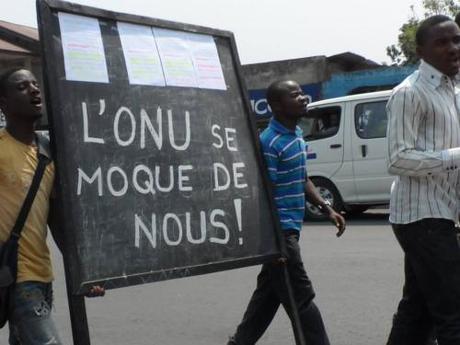
The board that these Congolese protesters in Goma – Eastern Congo carry reads “UN is mocking us.” For Congolese people it is time to end that mockery by demanding immediate removal of MONUSCO. As the situation evolves presently, it appears that any national uprising of the Congolese population against UN presence and Kabila government in Kinshasa will start in the Kivu provinces.
There is a saying in my language which translates closely as this: “ one who beats a dog means that they are after its master.” In the case of the Democratic Republic of Congo, the moral does not seem unfortunately to fit because there appears to be a lack of focus on the master, while people are attempting to beat the dog.
The genius about the initial thinkers of the UN system is that they have made us look at it as an indispensable structure of world peace, while those who firstly conceived it assigned it a mission of serving their selfish interests. And for that reason, the victors of World War II who sit at the core of the UN structure have so far resisted any fundamental change to its ways of operating since it would jeopardize and reduce their influence in world’s affairs.
Let’s look at the case of the Democratic Republic of Congo with more than 17,000 personnel of UN peacekeepers, the biggest ever assembled contingent for a particular mission. People forget that where there is the will, nothing is impossible. At the same time, history does not teach much to many of us.
Back in the Rwandan genocide of 1994, at the heights of the interethnic killings, the then rebel leader who is today the Rwandan president Paul Kagame threatened the UN telling them that he would treat as combatant enemies any peacekeepers that the international community would send to stop the war.
We all understand that US and UK were particularly supportive of the Rwandan Patriotic Front then for strategic reasons, but because of their influence at the UN Security Council, if they had wanted the UN to intervene, – the killings were such that, the RPF’s threats could’ve been overlooked. Despite that, the two countries decided to look away. However, at the time, Kagame’s threats had to be considered for any decision of sending a UN mission to Rwanda.
In the light of the recent resumption of fighting in Eastern Congo between the FARDC and M23, the attitude of the UN peacekeeping mission MONUSCO has been the most suspicious, for example by almost showing to Congolese forces on the battleground that it was not supportive of their total victory against M23 if this could ever happen. There are even questions arising about the core role of the additional unit – the international brigade of intervention.
Today to say that the UN peacekeeping mission in the DRC has failed would be considered as an understatement. But this would be a failure only if one looks at it from the Congolese people’s perspective or the victim side of the more than sixteen years of insecurity and total mayhem for millions of people in that country. From the point of view of those who benefited from the created and ongoing tragedy, meaning multinationals using minerals extracted from the Congolese soil, the UN mission could be rightly seen as an effective facilitator.
What is stopping Congolese to end the MONUSCO mission is a fundamental question many interested parties have been asking for a long time. Some go as far as suggesting that the general insecurity in the country, obviously at different levels, is purposely fueled and maintained to justify its presence.
It could be argued that it is because of a lack of leadership in the country. This has been the constant response for many years too. But those who side with such argument are sometime the same stakeholders who maintain a deliberate vacuum of strong leadership in DRC. They are the same structures which, while DRC is militarily engaged on the ground against M23 militia, allow and support President Joseph Kabila to travel to Belgium, because in the meantime they can guarantee an apparent ceasefire on the battlefield.
The UN system is everywhere in the Congolese institutions: economy, government departments, peace and security mechanisms, etc. As much as it is claimed that Rwandans have infiltrated Congolese structures of economic power, politics and military, the UN influence over the lives of millions in that heart of Africa should also be looked at in a similar light as far as the UN is concerned in DRC. The UN is running the country. DRC is under UN occupation.
That Congolese people in Goma, Brussels or elsewhere protest against their illegitimate president, they are right because on top of that, he has also significantly proven his overall incompetence in bringing peace to the country.
That they don’t put equal energy/emphasis in protesting against the continuous presence of MONUSCO and all the UN structures of occupation of their country, they are greatly missing the point of what they want: to free their country from foreign occupation. It is like forgetting that Kabila was not put in place or maintained in office by that UN system.
To be effective in that regard, it is important to focus on the master, – by working on ending the MONUSCO mission in DRC, rather than the messenger. The ongoing mood of popular unrest in Eastern Congo should focus on the UN presence rather than Joseph Kabila, because without that imperialism protection, he cannot last a day. In parallel, patriotic forces among the FARDC need to show more determination to be ready for the ultimate sacrifice in defending the legacy of Patrice Lumumba.
